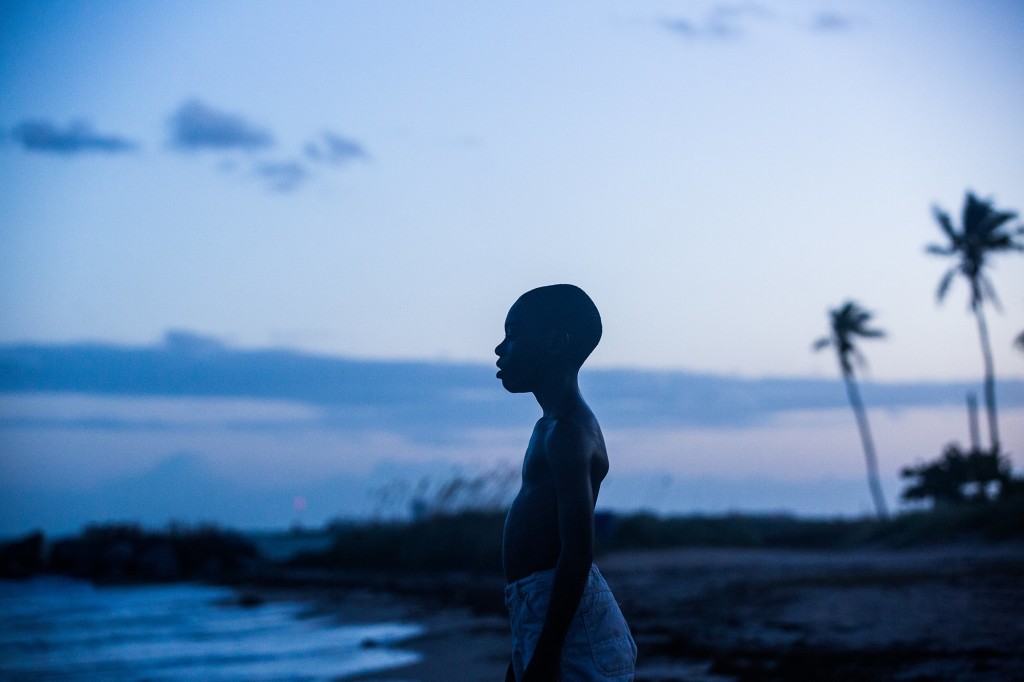
If 2016 was good for anything, it was film. It was a year with multiple incisive and must-watch documentaries, top-tier indie cinema from both newcomers and legends alike, and awards-season offerings that live up to every ounce of the hype. (Blockbusters, on the other hand… we won’t talk about.) 2017 looks to be right on par, but before we look forward, let’s take a moment to look back at the best of the best of 2016 in film.
Two perpetual disclaimers:
1) All of these rankings are based on the movies that I’ve seen so far. (Elle, The Edge of Seventeen, Hacksaw Ridge, and Christine are all films I haven’t gotten around to yet, amongst others.)
2) There are so many films it pains me to leave off my top ten. Just missing the cut this year are Andrea Arnold’s emotional road-trip odyssey American Honey, Pablo Larrain’s piercing psychological and historical dissection Jackie, Vikram Gandhi’s insightful and moving young Obama biopic Barry, Richard Linklater’s deceptively simple hang-out flick Everybody Wants Some!!, and Ava DuVernay’s immensely powerful and comprehensive documentary on the legacy of slavery in the United States 13th.
***
TOP TEN
- Weiner (dir. Josh Kriegman & Elyse Steinberg)

American politics in the twenty-first century: A congressman falls from grace in 2011 after it comes out that he has a predilection for sexting women who are not his wife. In 2013, after reconciling with both his wife and the public, he mounts a campaign for mayor of New York City and hires a camera crew to film his comeback.
It… doesn’t go quite according to plan. As a second sexting scandal emerges for Anthony Weiner, the camera crew he hired is there to capture it in detail as it breaks. The documentary ends up being less of a comeback story and more of an engrossing, entertaining, funny, unbelievably maddening, and unfortunately timely portrait of political narcissism. Kriegman and Steinberg capture the madness with a clear and focused fly-on-the-wall style, an eye always on the humans beyond the scandal. A single Huma Abedin look at her husband, a quiet moment between Weiner and his cellphone – these images tell us more than any newscast ever could.
- Knight of Cups (dir. Terrence Malick)
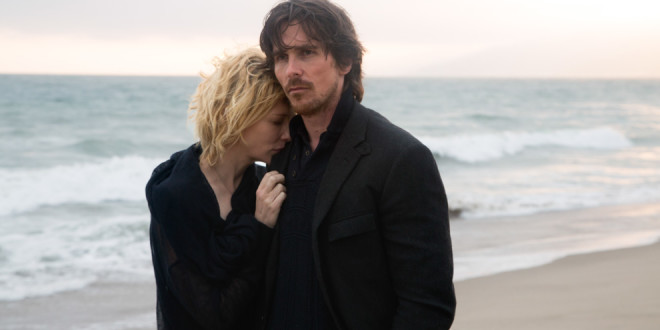
Terrence Malick has built his career around visually beautiful, philosophically dense tone poems about the human experience. His latest, the surreal Los Angeles stream-of-consciousness tome Knight of Cups, is enigmatic even by those standards. After all, the main character, successful screenwriter Rick (played with what I can only call emotive blankness by Christian Bale) barely says a word aloud the entire movie, even as we follow him through the various episodes of his life: decadent Hollywood parties, erotic trysts with various lovers, painful reunions with family members – reminding him of relationships that he uses the first two vices to forget. Rick is a passive observer in his own life – distant from other people, distant from any higher power, distant from himself. His melancholy plays out against the endless metropolitan skyscrapers of downtown L.A., the artificial facades of film sets, the swimming pools of the rich and famous. There is little narrative, few complete scenes, and no good guys or bad guys. We flow through moments as in memory, we probe mysteries as in prayer, with empathy foregrounded by cinematographer Emmanuel Lubezki’s perpetually wandering camera.
This film forms an unofficial trilogy with Malick’s previous semi-autobiographical works, The Tree of Life and To the Wonder, all powerful internal struggles about finding meaning in an artificial world. But if The Tree of Life paints in reconciliation, and To the Wonder regret, the brush Malick has chosen for Knight of Cups is malaise. It is a malaise Terrence Malick clearly knows well – one where empty successes can only momentarily contain evaporating souls, where the past and whatever pains it contains exists on the same streets as the present, where connection is fleeting, if it happens at all.
But, see, Malick and Rick’s malaise is one I too understand. How is Rick – or anybody – supposed to find himself when the world around him isn’t real? What do we need from the world and the people in it to make sense of ourselves? Knight of Cups is a tough, often contradictory movie that asks these questions and dozens of others, one that captures the soul of a man in quiet agony, one that, quite literally, ends when it begins.
- Don’t Think Twice (dir. Mike Birbiglia)
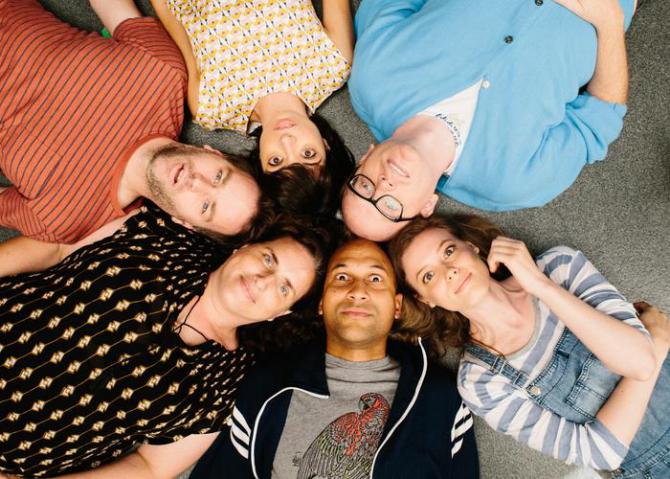
Mike Birbiglia’s sophomore film, set in the world of New York improv, is a (bitter)sweet look at mutual failure, ego, and friendship – and which of the three holds together our main characters.
Keegan-Michael Key, Gillian Jacobs, Kate Micucci, Chris Gethard, Tami Sagher, and Birbiglia himself are this core cast (and one of the best ensembles of the year), playing a modestly successful improv group dealing with two potential shake-ups to their status quo. First, the lease on their theater is up; second, two of their own have been scouted by Weekend Live, the SNL of this universe.
Birbiglia, a wonderful stand-up comedian who has proven himself to be a brilliant long-form storyteller through his one-man shows Sleepwalk With Me and My Girlfriend’s Boyfriend, also firmly establishes himself here as a screenwriter of great economy and feeling. The cast and his direction helps in this as well, but Don’t Think Twice accomplishes a lot in an extremely short run time. This is a 90-minute movie that gives each of its six main characters a distinct and affecting arc, building scenarios around gut-busting humor both in and out of the improv theater – and these improv scenes, it must be said, are absolutely perfect in capturing the joy of that specific artform – while still sneaking up on us with the occasional emotional wallop, formulating a distinct and complicated message to take away when the movie is over.
Happiness for others is hard, success requires concessions, and sometime improv – and truly any means of self-expression – can really feel like life or death. These are not easy resolutions, which makes their presence in a movie so funny and charming all the more impressive, surprising, and affecting.
- Zootopia (dir. Byron Howard & Rich Moore)
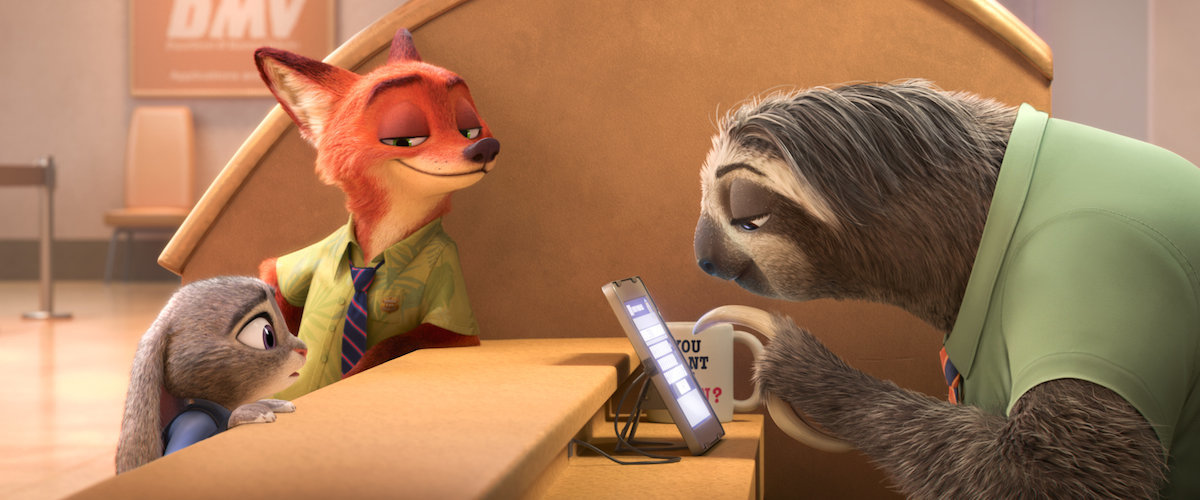
Disney Animation had a banner year, between the astonishing adventure film Moana and this, an uber-socially conscious morality tale starring a bunch of anthropomorphized animals tackling themes of microaggressions, police brutality, and race relations… all in the style of a peppy, entertaining kids film. While Moana is structurally a very classical Disney movie and was a good bet to be a smash hit, Zootopia had to have been a harder sell.
Judy Hopps (voiced by Ginnifer Goodwin) is a small-town rabbit with dreams of being a police officer in the vast and multicultural – ahem, multi-species – metropolis of Zootopia. When she finally gets the opportunity, she finds enforcing the law to be much tougher than expected, due to the hierarchy and bureaucracy of the ZPD, and the fact that she is constantly underestimated because of her size. When Hopps jumps (pun intended) on a missing animal case to prove herself, she is forced to team up with a con artist fox (voiced by Jason Bateman), who also has been underestimated and put-upon his whole life because of his species. As this unlikely duo dives deeper into the corrupt underbelly of the city, they expose many of the oppressive biases of Zootopia – both institutional and personal.
Of course, Zootopia is not a perfect one-to-one match to our real world, and therefore the commentary that the film Zootopia presents on its lofty topics is not a perfect match either. However, it’s enough to start a conversation, especially for younger audiences, and it’s pretty remarkable that Disney was able to do that within a beautifully noirish, terrifically entertaining, emotionally affecting animated film. For its incredible design, rewatchability, and thoughtful analysis of difficult topics, Zootopia was my favorite animated movie of 2016.
- Silence (dir. Martin Scorsese)
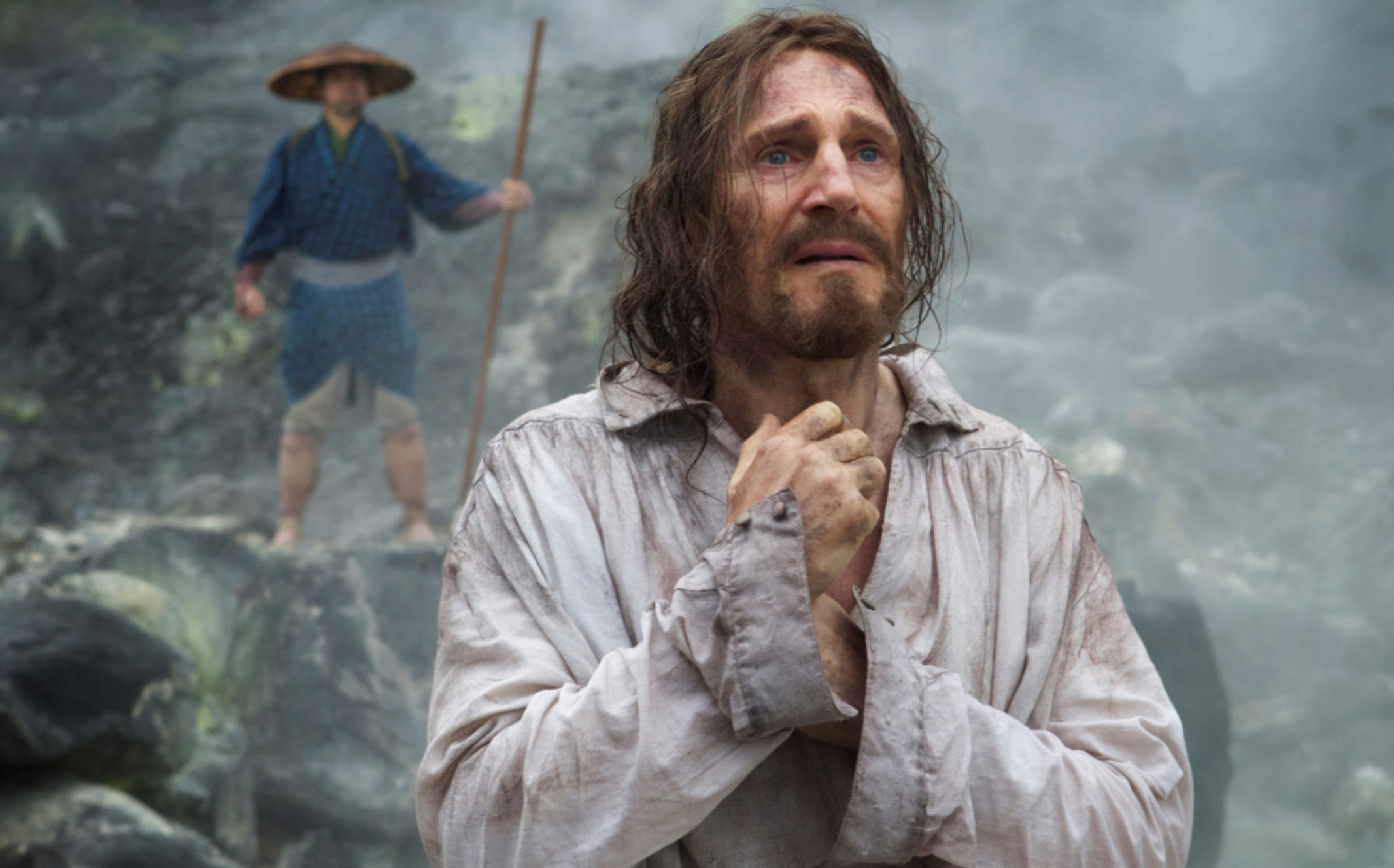
Martin Scorsese is one of the greatest directors ever, and this is his best movie in 25 years. An epic and intimate odyssey into the souls of three men – each oppressed by a force greater than themselves, each questioning their faith in their own way – Silence represents for Scorsese both a fascinating departure from his typical fare and roaring testament to his masterful abilities. He has wanted to make this movie since at least the 90s, and every second of thought he put into it shows on the screen.
In 17th century Japan, where Christianity has been outlawed, Portuguese Jesuit priest Father Ferreira (Liam Neeson) renounces his faith deep within the country. Years later, word of this reaches Fathers Rodrigues (Andrew Garfield) and Garrpe (Adam Driver), mentees of Ferreira, who decide to go to Japan to find their mentor and finish the mission he started to spread Christianity in the hostile country. As Rodrigues and Garrpe trek further into a land that wants their heads, they find solace in the Japanese Christians who have survived persecution for decades, as well as grapple with the silence they hear when they ask God why these people must suffer.
This is a harrowing and haunting film, perfectly paced at almost 3 hours, beautifully constructed around the silences that give the film its title. Scorsese, at almost 75, is still a remarkably patient director, letting beats play out with the acute emotional realism the story demands, and showing restraint to let moments of style and violence have all the more effect. Though this is certainly a challenging movie for its subject matter, it is one I look forward to revisiting over the years, for the sheer excellence of its storytelling and the beauty of its filmmaking.
- 10 Cloverfield Lane (dir. Dan Trachtenberg)
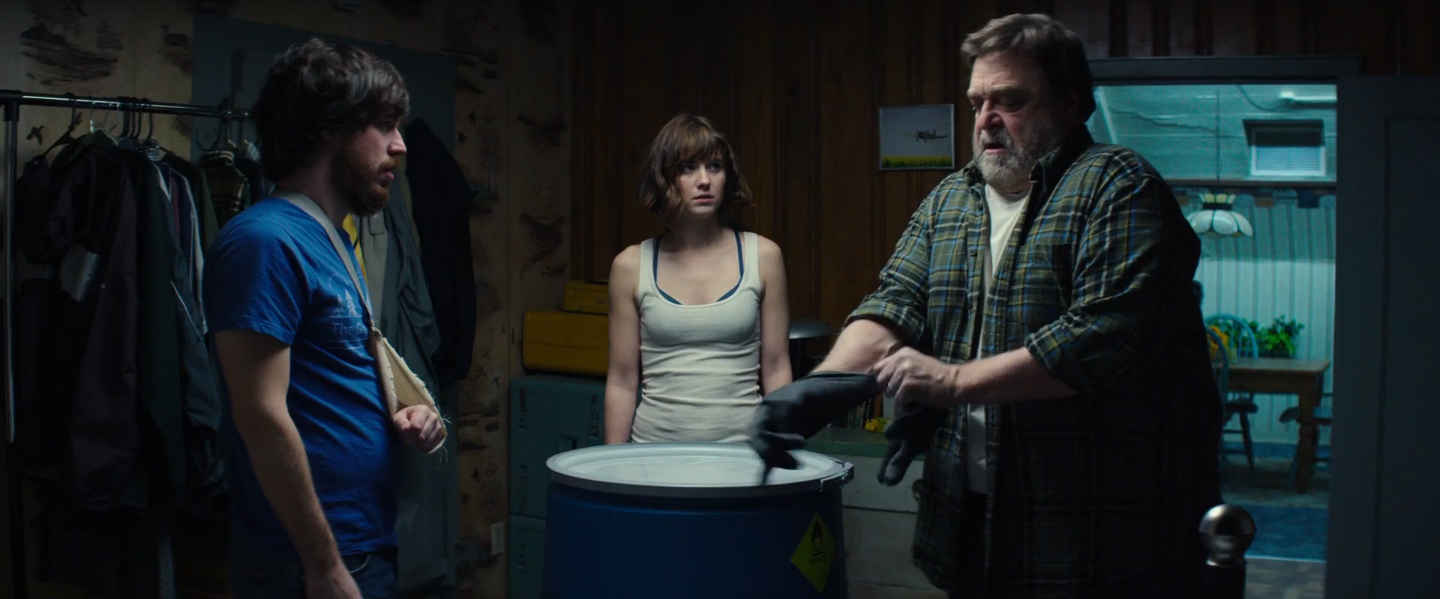
The best studio blockbuster of the year was released in March, takes place almost entirely in an underground bunker, and has only three central characters. 10 Cloverfield Lane is a crackerjack of a movie – a high-concept sci-fi flick that instead finds tension in the intricate psychologies and mood swings of its characters, a studio release that earns its gradually increasing scale and size, a chamber piece with thrills, scares, laughs, and true character moments – made all the more impressive by the fact that this is director Dan Trachtenberg’s feature debut.
In classic Twilight Zone-style, Trachtenberg has turned science fiction into parable, parable into emotional journey. The script, co-written by Damien Chazelle of Whiplash and La La Land fame, starts simple enough: Michelle (Mary Elizabeth Winstead) gets into a car crash, and wakes up in the bunker of Howard (John Goodman, in one of the best and most underrated performances of the year) who claims the outside world is uninhabitable due to a chemical attack. Initially backing up his story is another man, Emmett (John Gallagher Jr.), also in the bunker, who along with Michelle begins to question the verity of the events that have occurred, and whether Howard is quite as benevolent as he claims. Slowly, what starts as a bottled thriller evolves into an explosive allegory of survival and courage.
This kind of movie – one that infuses character drama into genre tropes – tends to be a kind I love. (Mad Max: Fury Road and The Grey are two such recent movies that I also adore.) But I also think this phenomenal film from early in the year deserves another look as we move into 2017. At its core, 10 Cloverfield Lane is about giving a shit. It’s about stepping up to the plate even when all seems lost, making the conscious decision to stay and help others in need, and doing whatever one can to live to fight another day.
- Manchester by the Sea (dir. Kenneth Lonergan)
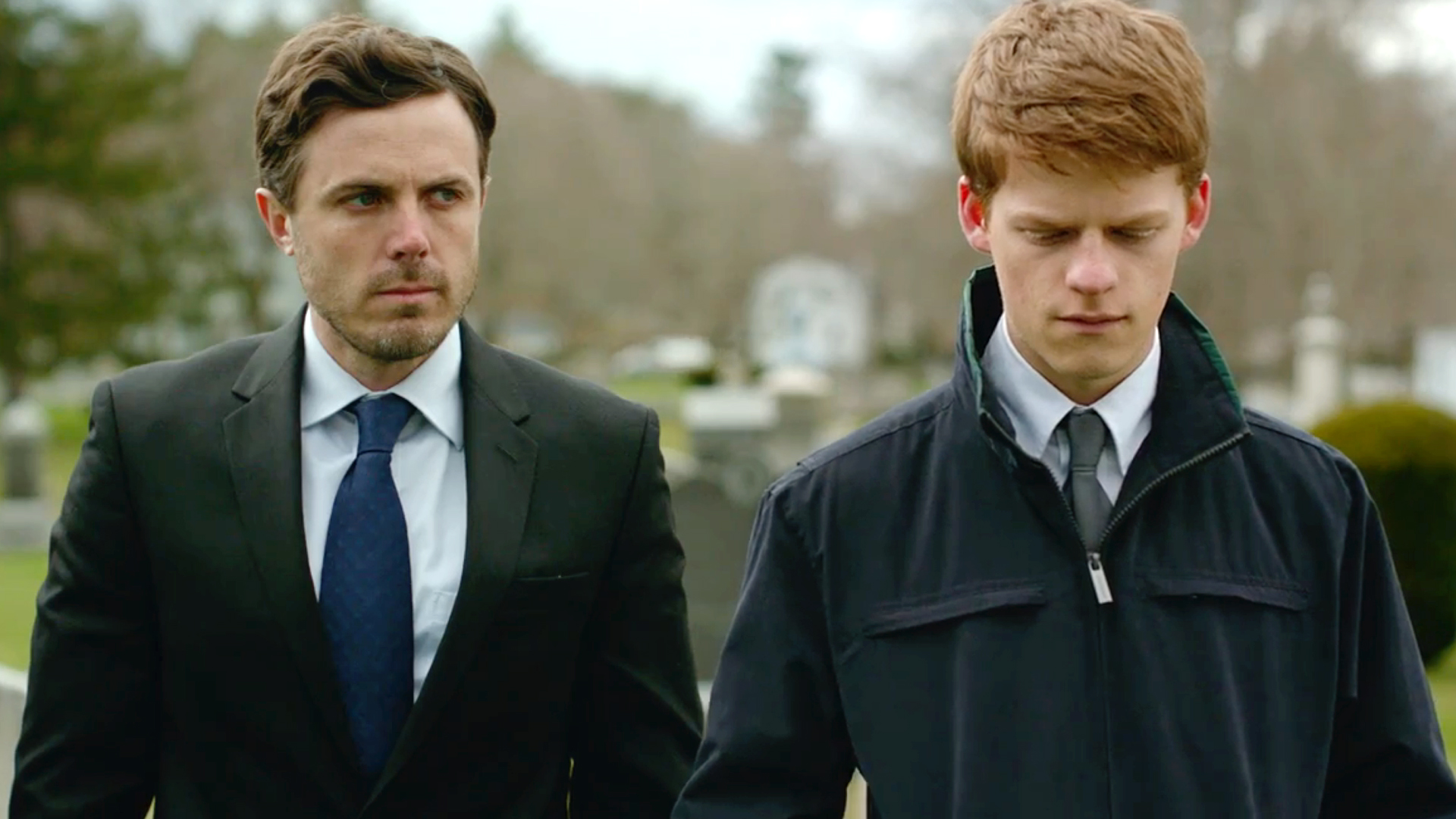
Lee Chandler is a quietly angry janitor and handyman in a suburb of Boston. He spends his days shovelling snow, repressing rage and every other emotion as he bickers with various tenants, and drinking himself into a horrific stupor when he gets off work. He lives in a one-room basement apartment and rarely holds conversation with anyone for longer than thirty seconds. He is not an everyman – he is a ghost, a man who has to constantly turn off the rolling film of the past playing in his mind.
One day, everything changes with a simple phone call. Lee’s brother Joe has died, and Lee is forced to return to a town that clearly is the weight of his most painful memories: Manchester by the Sea. Eventually, when Lee learns that Joe asked in his will for Lee to move back to Manchester to take care of Joe’s teenage son Patrick, we begin to learn why exactly Lee left Manchester, and why coming back is painful, if not impossible.
This film, written and directed with subtlety and care by Kenneth Lonergan, is one of the most complex emotional marvels to come out in some time. It’s a devastating work of art, expertly constructed and edited – one of the best cinematic representations of memory I can think of. Michelle Williams and Lucas Hedges turn in some of the best performances of the year, but this is Casey Affleck’s movie, and his Lee is simply one of the best pieces of acting you’re ever going to see. Like the rest of this astonishing and heartbreaking film, Affleck as Lee does so little, but says so much.
- Toni Erdmann (dir. Maren Ade)
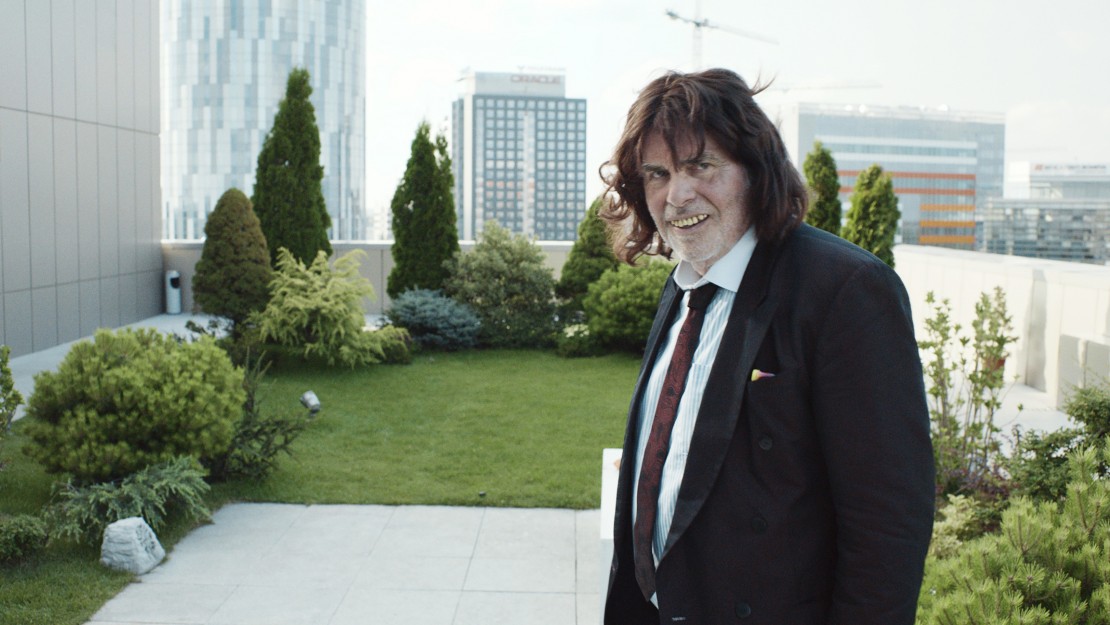
I’ll start this blurb in the same way all reviews of this film have started, because it cannot be overstated how much Toni Erdmann defies categorization:
This is a nearly 3-hour German absurdist-comedy-slash-harrowing-workplace-drama-slash-father-daughter-love-story, and it is amazing.
It’s a story that almost certainly shouldn’t work, but does every single step of the way, thanks mainly to director Maren Ade’s masterful control of tone, and the absolutely fearless performances of the central actors, Peter Simonischek and Sandra Huller. Simonischek plays Winfried, an aging schoolteacher and piano instructor with a (sometimes grating) penchant for practical jokes. After his beloved dog passes away, he decides to drop in unannounced on his daughter Ines (Huller), who is consulting for an oil company in Bucharest, and who has tried so hard to get away from the temperament of her father by diving into the corporate world that she has sacrificed much of her own dignity and happiness along the way.
What follows is a hysterical, awkward, intense, oft-cringeworthy, oft-gross, and, finally, insanely moving journey of reconciliation and gradual growth. The 162-minute runtime flies by, with every second used to its fullest potential to build to and justify the final comedic and emotional set-piece, which had me crying from laughter and then crying from genuine feeling within approximately five minutes. Simply masterful.
Also, keep your eyes and ears out for the best scene of the year, one involving Whitney Houston’s “The Greatest Love of All.” It’s a song so blatantly on-the-nose in the context in which it’s used that it actually comes around to being quite touching. Like so much of Toni Erdmann, that scene teeters on the edge of not working – but it’s exactly that precariousness, eventually landing firmly in transcendence, that makes Ade’s film such a thrilling and unique viewing experience.
- O.J.: Made in America (dir. Ezra Edelman)
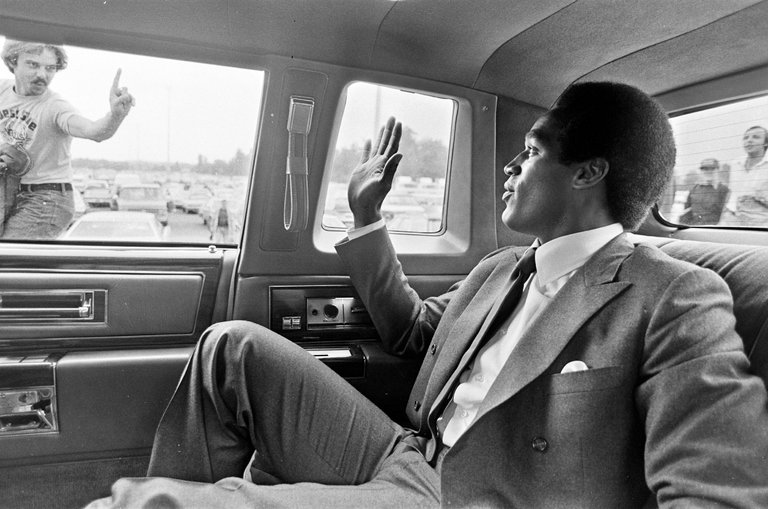
Growing up in Brentwood, a suburb of Los Angeles, O.J. Simpson is a name I feel like I’ve always known. It’s where he lived when he was arrested for the murders of Nicole Brown Simpson and Ron Goldman in 1994. My parents, like most of the city, remember exactly what they were doing when helicopters roared overhead, following Simpson in a white Ford Bronco as he sped from justice down the 405. The verdict that Simpson had been found not guilty came out less than a month after I was born. I drove past what were the scenes of the crime – Bundy, Rockingham – almost every day as I drove to school or friends’ houses. But it took O.J.: Made in America for me to, amongst other things, see my home neighborhood in a completely different light.
The story of O.J. Simpson had a resurgence in 2016, and it’s not hard to see why. Police brutality, institutional distrust, celebrity idolatry – it’s almost like more than a handful of the things that defined the sensation that was Simpson’s murder trial are still things we are dealing with as a society today! But documentaries, of all art forms, have the unique ability to look at the past to understand the present, which Ezra Edelman clearly understands. O.J.: Made in America is an eight-hour documentary that provides every single iota of context and detail we could ever want on O.J. Simpson and the society that created him, harbored him, and eventually spat him out.
Initially playing theatrically before airing on ESPN in five parts (which is why I include it on this list), Edelman’s documentary is an epic and engaging and unbelievably thorough examination of the complicated place known as the United States of America. Miraculously editing archive footage covering fifty years with insightful and poignant interviews, this film shows that the more we understand the circumstances surrounding the rise and fall of O.J. Simpson – race, celebrity, media, criminal justice, police brutality, and more, all of which we understand quite well in relation to Simpson by the end – the more we see how a society is always more complex than simply the sum of its parts, and the more we see that screens are almost always mirrors.
- Moonlight (dir. Barry Jenkins)
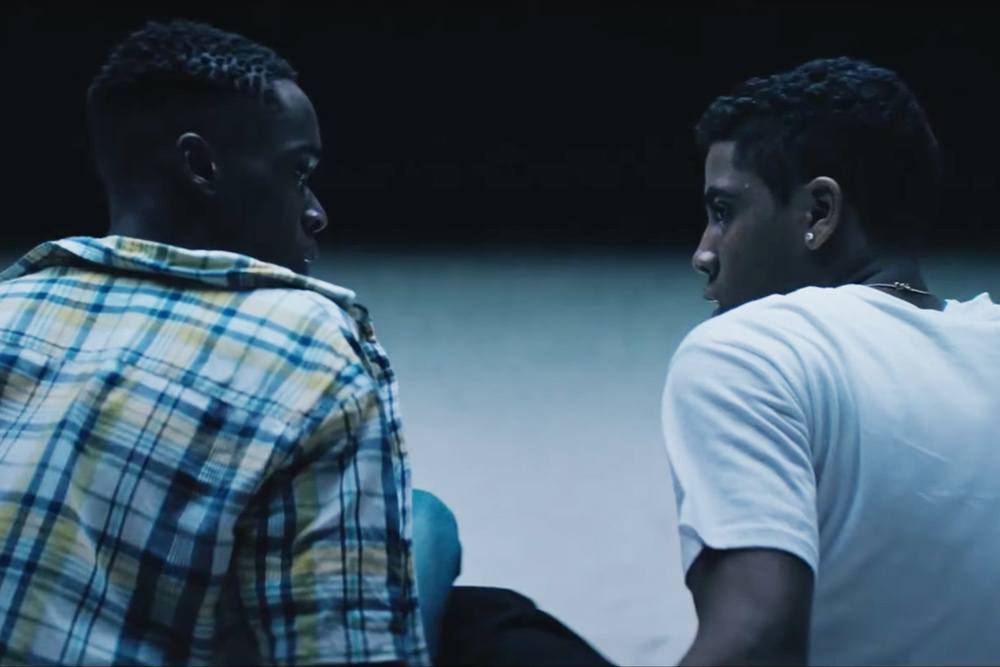
What is film at its best? What does cinema do that no other medium can? Why do people sit in a dark room with complete strangers, and watch light bounce off a silver screen? As a person who wants to pursue film as a career, I think about questions like these a lot. And what I always come back to is one simple, loaded word: empathy.
Film can put us into the minds of people in a way that is visual and deeply emotional, subjective as well as objective. It can relay complex mosaics of feeling and experience, represented until digestible, comprehensible. It finds universality in specificity, truth in narrative. Films are empathy machines, and as empathy becomes more important, the work of storytellers – especially in film – does as well.
For my money, there was no film in 2016 that did a better job of placing the audience into its central character’s experience than Barry Jenkins’ Moonlight.
This is a film that defies easy summary or resolution. It follows Chiron, a young black man growing up in Miami, through three chapters of his life. He deals with his mother’s crack addiction; he befriends a local drug dealer and his wife; he changes his moniker more than once; he finds his complicated sexuality emerge. Three actors play Chiron, one for each chapter – they look alike in the ways that count. Change – especially the change that happens to Chiron – tends to render us different people than we once were.
Seeds planted in chapter 1 pay off in chapter 3. Characters die and get incarcerated and save themselves off-screen, in the years we don’t see. Like the stories of our lives, this one doesn’t end in a way that can be described at all as neat. Instead, Moonlight, like Chiron, struggles. It struggles for resolution, it struggles for peace. It struggles to provide a sufficient summarization of the totality of Chiron’s experience, in a way that only film can.
But it does so with beauty, ingenuity, and – eventually – understanding. Understanding that perhaps we never really find total peace within ourselves, but instead that we take steps. One step forward, and another – each step wading us further into an ocean, with each step adjusting to the ebb and flow of the water, its dangerous currents and impossible strength, struggling to float, until–
–we swim.
***
LINEUPS
BEST PICTURE
- Moonlight
- O.J.: Made in America
- Toni Erdmann
- Manchester by the Sea
- 10 Cloverfield Lane
- Silence
BEST DIRECTOR
- Barry Jenkins, Moonlight
- Martin Scorsese, Silence
- Maren Ade, Toni Erdmann
- Dan Trachtenberg, 10 Cloverfield Lane
- Kenneth Lonergan, Manchester by the Sea
- Terrence Malick, Knight of Cups
BEST ACTOR
- Casey Affleck, Manchester by the Sea
- Daniel Radcliffe, Swiss Army Man
- Peter Simonischek, Toni Erdmann
- Shahab Hosseini, The Salesman
- Viggo Mortensen, Captain Fantastic
- Jeff Bridges, Hell or High Water
BEST ACTRESS
- Krisha Fairchild, Krisha
- Sandra Huller, Toni Erdmann
- Sally Field, Hello, My Name is Doris
- Viola Davis, Fences
- Sarah Paulson, Blue Jay
- Emma Stone, La La Land
BEST SUPPORTING ACTOR
- John Goodman, 10 Cloverfield Lane
- Lucas Hedges, Manchester by the Sea
- Sam Neill, Hunt for the Wilderpeople
- Tom Bennett, Love & Friendship
- Ralph Fiennes, A Bigger Splash
- Farid Sajjadi Hosseini, The Salesman
BEST SUPPORTING ACTRESS
- Gillian Jacobs, Don’t Think Twice
- Margo Martindale, The Hollars
- Michelle Williams, Manchester by the Sea
- Molly Shannon, Other People
- Greta Gerwig, 20th Century Women
- Naomie Harris, Moonlight
BEST ORIGINAL SCREENPLAY
- Manchester by the Sea, by Kenneth Lonergan
- Don’t Think Twice, by Mike Birbiglia
- Zootopia, by Jared Bush and Phil Johnston
- The Salesman, by Asghar Farhadi
- Morris from America, by Chad Hartigan
- 10 Cloverfield Lane, by Damien Chazelle and Josh Campbell & Matthew Stuecken
BEST ADAPTED SCREENPLAY
- Moonlight, by Barry Jenkins
- Silence, by Jay Cocks and Martin Scorsese
- Hunt for the Wilderpeople, by Taika Waititi
- Arrival, by Eric Heiserrer
- Indignation, by James Schamus
- The Handmaiden, by Seo-kyeong Jeong and Chan-wook Park
***
ROSTER
A
- Moonlight
- O.J.: Made in America
- Toni Erdmann
- Manchester by the Sea
- 10 Cloverfield Lane
A-
- Silence
- Zootopia
- Don’t Think Twice
- Knight of Cups
- Weiner
- 13th
- Everybody Wants Some!!
- Barry
- Jackie
B+
- American Honey
- The Salesman
- Krisha
- Hell or High Water
- De Palma
- Arrival
- Captain America: Civil War
- Moana
- Voyage of Time: The IMAX Experience
- Paterson
- Hunt for the Wilderpeople
- La La Land
- Loving
- Little Men
- Morris from America
- Green Room
- Under the Shadow
- Swiss Army Man
- The Lobster
- The Handmaiden
- The Invitation
- Sing Street
- Tickled
- Pete’s Dragon
B
- 20th Century Women
- Café Society
- Doctor Strange
- The Fits
- Hail, Caesar!
- Rogue One: A Star Wars Story
- Deadpool
- The Witch
- Lion
- Blue Jay
- Sausage Party
- The Meddler
- Finding Dory
- Eye in the Sky
- Captain Fantastic
- Popstar: Never Stop Never Stopping
- Florence Foster Jenkins
- The Shallows
- Bad Moms
B-
- Fences
- The Hollars
- Hello, My Name is Doris
- Indignation
- The Birth of a Nation
- Jason Bourne
- Neighbors 2: Sorority Rising
- Star Trek Beyond
- Other People
- Hidden Figures
- Whiskey Tango Foxtrot
- Tallulah
- Snowden
- Allied
C+
- Too Late
- The BFG
- Kubo and the Two Strings
- White Girl
- High-Rise
- The Conjuring 2
- Midnight Special
- Anthropoid
- The Nice Guys
- Love & Friendship
- Maggie’s Plan
C
- Triple 9
- The Light Between Oceans
- Ghostbusters
- The Fundamentals of Caring
- Southside With You
- A Monster Calls
- Equity
- The Jungle Book
- War Dogs
- A Bigger Splash
C-
- X-Men: Apocalypse
- Money Monster
- The Accountant
- Nocturnal Animals
- The Secret Life of Pets
D+
- Now You See Me 2
- Sully
- The Purge: Election Year
D
- Central Intelligence
- Mike and Dave Need Wedding Dates
- Fantastic Beasts and Where to Find Them
D-
- The Neon Demon
- The Legend of Tarzan
- Batman v. Superman: Dawn of Justice
F
- Suicide Squad
